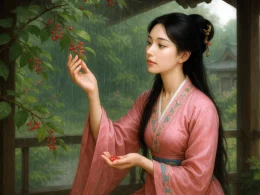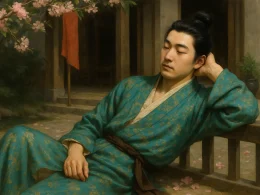At night I arrive at the Clear Stream to lodge;
The host’s home is nestled in the bluish cliffs.
Stars and constellations hang from the eaves and pillars;
The pillow and mat echo with the chatter of wind and water.
When the moon sets in the western mountains,
The night apes begin their chirping cries.
Original Poem
「宿清溪主人」
李白
夜到清溪宿,主人碧岩里。
檐楹挂星斗,枕席响风水。
月落西山时,啾啾夜猿起。
Interpretation
Composed around 750 CE during Li Bai's travels, this poem reflects the poet's characteristic state after leaving court life—immersing himself in nature and seeking spiritual solace. The "Clear Stream" (清溪) serves not merely as a geographical location but symbolizes a spiritual realm of clarity and detachment from worldly cares. This nocturnal stay represents not just lodging but a silent dialogue with cosmos where heaven, earth and stars breathe together.
First Couplet: "夜到清溪宿,主人碧岩里。"
Yè dào Qīngxī sù, zhǔrén bì yán lǐ.
Nightfall finds me lodging by Clear Stream; My host dwells deep within jade cliffs.
The opening narrates plainly yet profoundly. "Nightfall" sets temporal atmosphere and foreshadows nocturnal sensations. "Jade cliffs" suggests both the dwelling's secluded environment and the host's reclusive nobility, establishing the poem's refined tone.
Second Couplet: "檐楹挂星斗,枕席响风水。"
Yán yíng guà xīngdǒu, zhěn xí xiǎng fēngshuǐ.
Stars hang between eaves and pillars; Wind-water music echoes through my mat.
This couplet achieves miraculous synthesis of cosmic grandeur and humble dwelling through visual and auditory dimensions. "Stars hang" represents ultimate exaggeration—drawing the vast cosmos into the architectural space, making the mountain hut a cosmic center. "Wind-water music" shifts from macroscopic to microscopic, where atmospheric and aquatic sounds penetrate the bedding, embodying the poet's physical and spiritual communion with nature through tactile-auditory synesthesia.
Third Couplet: "月落西山时,啾啾夜猿起。"
Yuè luò xīshān shí, jiūjiū yè yuán qǐ.
Moon sinks behind western hills; Night apes begin their chirping calls.
The conclusion marks temporal progression and atmospheric transition. The moonset suggests dawn approaching after a sleepless night of cosmic contemplation. The apes' "chirping" breaks the stillness without harshness, instead infusing mountain vitality into the landscape, concluding with lingering auditory resonance.
Holistic Appreciation
The poem's artistic achievement lies in constructing a perfect transition from "human realm" to "cosmic realm." The poet's movement (night arrival → lodging) provides narrative thread, while sensory progression forms the core: finding shelter (stability), dwelling with stars (expansion), listening to wind-water (internalization), and merging with mountain dawn (unity). Without explicit emotion, experiential phrases like "stars hang" and "wind-water music" create immersive empathy, conveying the poet's self-forgetful unity with cosmic spirit. The poem embodies serene beauty pulsating with cosmic breath and life rhythm.
Artistic Merits
- Three-Dimensional Sensory Blend: The poem integrates vision (jade cliffs, stars, moonset), hearing (wind-water music, ape calls) and touch (mat) into immersive mountain-night experience.
- Masterful Exaggeration and Synesthesia: "Stars hang" is visual hyperbole bringing distant cosmos near; "wind-water music" is tactile-auditory synesthesia internalizing external scenery—jointly enhancing expressive power and mystical quality.
- Ultimate Motion-Quiet Contrast: "Wind-water music" and "night apes call" use subtle, ethereal sounds to accentuate overarching mountain stillness, achieving "cicadas' drone deepens wood's stillness" effect.
- Natural Structural Flow: Following chronological sequence (night arrival → moonset), the poem progresses through layered emotion and atmosphere from concrete to abstract, stillness to spirit, demonstrating rigorous yet natural composition.
Insights
This poem presents a life rhythm profoundly different from modernity—a deep, nature-synchronized dwelling. In our era of information overload and sensory overstimulation, Li Bai's "wind-water music through mat" offers precious revelation: true tranquility and fulfillment may lie not in possession but in depth of perception. It reminds us to periodically withdraw from noise to experience more authentic living: making stars our canopy, wind our symphony, recalibrating inner rhythm through absolute silence and natural melody, rediscovering our primordial connection with cosmos. This experience represents ancient wisdom against spiritual exhaustion and for profound healing.
About the poet

Li Bai (李白), 701 - 762 A.D., whose ancestral home was in Gansu, was preceded by Li Guang, a general of the Han Dynasty. Tang poetry is one of the brightest constellations in the history of Chinese literature, and one of the brightest stars is Li Bai.












